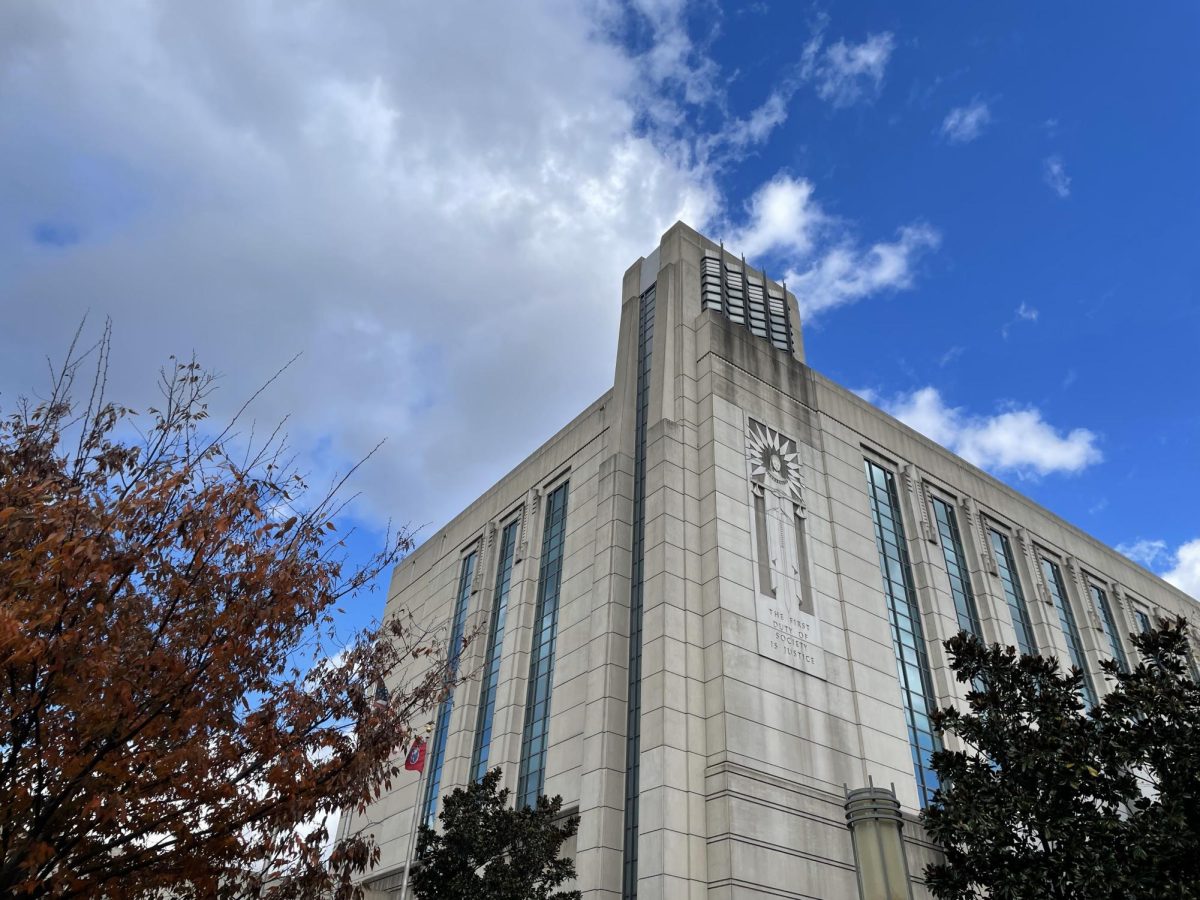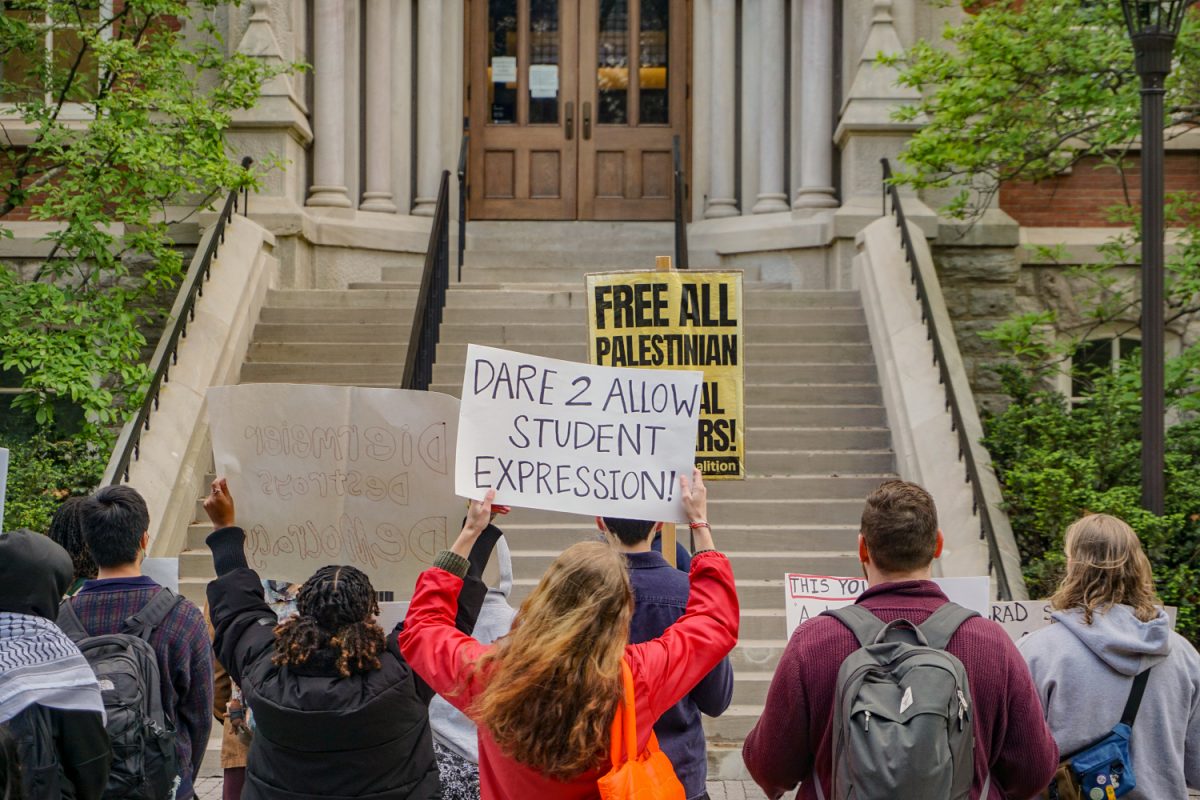Vanderbilt Student Government Senate passed two resolutions on April 9 condemning the university’s response to the March 26 Kirkland sit-in. The first resolution, 23-24-17, alleges that the university broke its commitment to free speech and principled neutrality, as well as demands an independent review of Chancellor Daniel Diermeier and the Board of Trust’s response to the protest. The second resolution, 23-24-18, calls for the dismissal of suspensions and expulsions and reduced probation time for the 27 protesters affected.
According to former VSG President Sam Sliman, a senior, both resolutions passed with an overwhelming majority as a result of a vote by voice. Sliman said he was surprised by the strength of consensus among senators.
“Very rarely do we see statements about controversial events receive so much support, but it’s clear that the students feel that the way Vanderbilt is handling this isn’t acceptable,” Sliman said.
Resolution 23-24-17
The first resolution — titled “A Resolution Calling for Accountability for University Violations of Free Speech” — was proposed by Deputy Speaker of the Senate Jayce Pollard, a junior, and signed by student leaders of VSG and the Multicultural Leadership Council, as well as seven professors.
This resolution highlights ways in which VSG believes the university has violated free speech, including the cancellation of the BDS referendum and the open letters sent by faculty, resident advisors, alumni and members of Nashville’s Metropolitan Council. The resolution alleges the university treated protestors with hostility.
“Whereas, Vanderbilt University arrested a reporter covering student protests; treated student protesters with hostility; issued interim suspensions to protestors without due process, including to an uninvolved student; published misleading and inaccurate statements regarding the protests; and overstepped in its punishment of student protesters, including through the use of expulsion,” the resolution reads.
The resolution “expressly condemns” the actions taken by the university and Diermeier in response to the amendment and the sit-in. VSG calls for a new review or an expansion to the existing one, with the inclusion of the Board of Trust’s oversight, to reexamine the university’s actions. The university did not comment on whether there would be an investigation by the Board of Trust.
“The findings of these investigations, as well as the decision-making process in response to their findings, must be made public and transparent to the Vanderbilt community,” the resolution reads.
MLC President Zack Maaieh, a junior, said he felt the resolution was necessary to promote transparency within actions of the administration, criticizing that the video released by the university of the protesters’ entrance into Kirkland was sped up, blurred and unclear. Maaieh said he hopes the university’s accountability measures will be made public.
“The University needs to hold its leaders accountable to a higher standard, and that starts with letting credible First Amendment experts review all of the evidence. That means bringing in someone who isn’t a Vanderbilt employee or tied to the University and who actually has free speech experience,” Maaieh said.
Resolution 23-24-18
The second resolution is titled “A Resolution Supporting the Appeal Case for the 27 Kirkland Sit-in Protesters.” VSG Vice President Kendelle Grubbs, a senior, and VSG Chief of Staff Nicole Reynaga co-wrote the resolution.
The resolution claims the university’s response to the protest was “excessively harsh” compared to their responses to other “far more extreme” cases. The resolution explicitly compares a case of sexual assault in which the perpetrator was not expelled to the present case where three students who participated in the sit-in were expelled after their preliminary hearings.
“These drastically unequal outcomes call into question the ultimate fairness and bias present in Vanderbilt’s Office of Student Accountability,” the resolution reads.
The resolution alleges the university has issued more “restrictive” policies surrounding student activism on campus in recent years and calls for a reduction in punishment for the students involved in the sit-in to encourage free speech on campus. The university did not respond to The Hustler’s request for comment on whether the administration would reconsider the punishments.
“Vanderbilt Student Government requests that the expulsions and suspensions issued to affected students be dismissed and the length of probation for affected students be significantly reduced in order to maintain an environment conducive to encouraging student activism and free speech without the fear of excessive punitive action from the University,” the resolution reads.
Reynaga said one of the main purposes of the resolution is to show that among VSG’s main responsibilities is voicing student concerns. She expressed concern that students incorrectly believe that VSG is “apolitical” with the sole purpose of allocating funds and organizing events.
“While obviously those are both a large and important part of VSG, bringing about the change that a majority of Vanderbilt students want should also be an essential part of the [organization],” Reynaga said in an email to The Hustler.










ew4g • Apr 26, 2024 at 1:56 pm CDT
The first resolution is nonsense as Tennessee law (SJR-170 2015; SB-1993 2022) prohibits these exact types of boycotts, and if the University had allowed the vote then faculty could risk losing grants. A private university preventing a vote on an illegal proposal is not a first amendment violation.
Additionally:
Seeing that none of the issues raised are first amendment issues, I don’t see why the resolution would call to bring in an “outside expert” on free speech. It’s just nonsense and performative pandering.
The second resolution is not much better. If you don’t like sexual assault suspects staying on campus – blame Donald Trump and Betty DeVos, not Vanderbilt. The Department of Education set strict rules protecting the accused. I strongly do not agree with the rules – but the rules exist at a federal level. I highly doubt Vanderbilt wants to risk its federal funding.
angry student • May 2, 2024 at 12:56 am CDT
anti-boycott laws have repeatedly been deemed unconstitutional. if the university actually cared about free speech as they claim, then they wouldn’t blindly bend to the far-right in the tennessee legislature—they would follow the recommendation the condemnation from the law school and would actually allow the referendum to go through and challenge the law in court.
also, the reporter himself claimed that he had not been told to leave a single time before being arrested, and all his charges were dropped because the DA realized how ridiculous his arrest was. maybe don’t blindly accept whatever narrative the university pushes forward.
VU 25 • Apr 24, 2024 at 1:12 pm CDT
Columbia, Berkley, Princeton, et al are producing a lot of graduates who are future liabilities for your HR department.
ANN • Apr 23, 2024 at 6:58 pm CDT
As students whose tuitions are paid for by your parents, or the University, or both, you guys have one job.
One day, if you’re lucky enough to make it to a real leadership position, maybe you will understand.
Nacho • Apr 23, 2024 at 4:51 pm CDT
1. For years, we’ve been told by these activists and their faculty allies that it’s unconscionable to give certain parties a platform, or to allow speech that impacts the feelings of minority groups. All of a sudden, the same activists and faculty are holding forth on the inviolable sanctity of free expression. Curious.
2. These protesters assaulted a security guard and used force to prohibit access to a private building. They’re lucky they haven’t all been expelled. They should have been — and I hope the guard presses charges.
3. Happily, student government is as meaningless in university as it is in high school.
VU 25 • Apr 24, 2024 at 1:10 pm CDT
This is a problem with letting DEI ideology onto college campuses. DEI divides people into groups (oppressors and victims) instead of treating people as individuals and we are seeing the results.
aiMee • Apr 24, 2024 at 2:43 pm CDT
Mr. Sliman appears to agree with your 3rd point – From The Hustler last year
A big part of your campaign platform was to ‘dissolve VSG.’ What are your plans to do so?
Sliman: I recently met with the student who led the efforts to dissolve Harvard student government, and we talked for a while about his whole philosophy behind it and how he made it happen. Then, we talked about how it relates to our ideas about what a student government should look like. At the end of the day, a student government is not a government. It has no legislative power. It cannot pass laws. I think it is time we stop pretending like it is one. There is no reason for us to have a three-branch system to emulate the American government or all of the unnecessary bureaucracy and committees.
RICK • Apr 20, 2024 at 11:42 pm CDT
I don’t know what the student government expects, the university to do nothing? If the donors for the university don’t like anti-Israel or anti-Zionist protests, they are going to withhold donations to the school unless VU acts as we saw with Harvard. And secondly, this is a private university so the university owes them nothing.